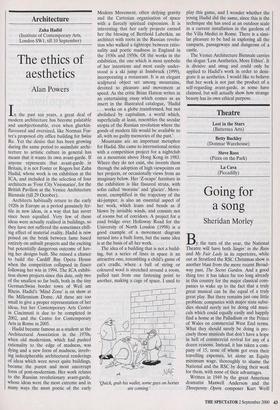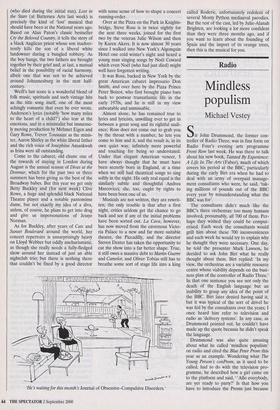Theatre
Lost in the Stars (Battersea Arts) Betty Buckley (Donmar Warehouse) Steve Ross (Pizza on the Park) La Cava (Piccadilly)
Going for a song
Sheridan Morley
By the turn of the year, the National Theatre will have both Singin' in the Rain and My Fair Lady in its repertoire, while out at Stratford the RSC Christmas show is another blast from the more recent Broad- way past, The Secret Garden. And a good thing too: it has taken far too long already in this country for the major classical com- panies to wake up to the fact that a truly great musical can be the equal of a truly great play. But there remains just one little problem: companies with major state subsi- dies should surely not be doing old musi- cals which could equally easily and happily find a home at the Palladium or the Prince of Wales on commercial West End terms. What they should surely be doing is pre- cisely those musicals that don't have a hope in hell of commercial revival for any of a dozen reasons. Instead, it has taken a com- pany of 15, none of whom got even their travelling expenses, let alone an Equity minimum wage, thoroughly to shame the National and the RSC by doing their work for them, with none of their advantages. Written in 1949 by the great American dramatist Maxwell Anderson and the Threepenny Opera composer Kurt Well (who died during the initial run), Lost in the Stars (at Battersea Arts last week) is precisely the kind of 'lost' musical that should have been at the National years ago. Based on Alan Paton's classic bestseller Cry the Beloved Country, it tells the story of a black Anglican priest whose son inadver- tently kills the son of a liberal white landowner during a bungled robbery. As the boy hangs, the two fathers are brought together by their grief and, at last, a mutual belief in the possibility of racial harmony, albeit one that was not to be achieved around Johannesburg in the next half- century.
Weill's last score is a wonderful blend of folk music, spirituals and such vintage hits as the title song itself, one of the most achingly romantic that even he ever wrote. Anderson's lyrics (notably 'how many miles to the heart of a child?') also tear at the emotions, and in a minimalist but immense- ly moving production by Mehmet Eigen and Gary Rowe, Trevor Toussaint as the minis- ter, Aaron Shirley as the white liberal father and the rich voice of Josephine Amankwah as Irina were all outstanding.
Come to the cabaret, old chum: one of the rewards of staying in London during August is the annual season of Divas at the Donmar, which for the past two or three summers has been giving us the best of the Broadway babes. But this year we get only Betty Buckley and (for next week) Clive Rowe, a huge and splendid black National Theatre player and a notable pantomime dame, but not exactly my idea of a diva, unless, of course, he plans to get into drag and give us impersonations of Jessye Norman.
As for Buckley, after years of Cats and Sunset Boulevard around the world, her concert repertoire is unsurprisingly heavy on Lloyd Webber but oddly uncharismatic, as though she really needs a fully-fledged show around her instead of just an able nightclub trio; but there is nothing there that couldn't be fixed by a good director with some sense of how to shape a concert running-order.
Over at the Pizza on the Park in Knights- bridge, Steve Ross is in twice nightly for the next three weeks, joined for the first two by the veteran Julie Wilson and then by Karen Akers. It is now almost 30 years since I walked into New York's Algonquin Hotel one cold winter's night and heard a young man singing songs by Noel Coward which even Noel (who had just died) might well have forgotten writing.
It was Ross, backed in New York by the great American cabaret impresario Don Smith, and over here by the Pizza Prince Peter Boizot, who first brought piano bars back to postwar transatlantic life in the early 1970s, and he is still in my view unbeatable and unmissable.
Almost alone, he has remained true to lyrics and lyricists, unwilling ever to get in between a great song and its rightful audi- ence; Ross does not come out to grab you by the throat with a number, he lets you come to him and it, and the result is, in its own quiet way, infinitely more powerful and touching for being so understated. Under that elegant American veneer, I have always thought that he must have been secretly born in England, at a time when we still had theatrical songs to sing softly in the night. His only real equal is the similarly subtle and thoughtful Andrea Marcovicci; she, too, ought by rights to have been born one of us.
Musicals are not written, they are rewrit- ten; the only trouble is that after a first night, critics seldom get the chance to go back and see if any of the initial problems have been sorted out. La Cava, however, has now moved from the cavernous Victo- ria Palace to a new and far more suitable theatre, the Piccadilly, and the director Steven Dexter has taken the opportunity to cut the show into a far better shape. True, it still owes a massive debt to Martin Guerre and Camelot, and Oliver Tobias still has to breathe some sort of stage life into a king He's waiting for this month's Journal of Obsessive—Compulsive Disorders.' called Roderic, unfortunately redolent of several Monty Python mediaeval parodies. But the rest of the cast, led by Julie-Alanah Brighten, are looking a lot more confident than they were three months ago, and if you want to learn about the founding of Spain and the import of its orange trees, then this is the musical for you.



























































 Previous page
Previous page